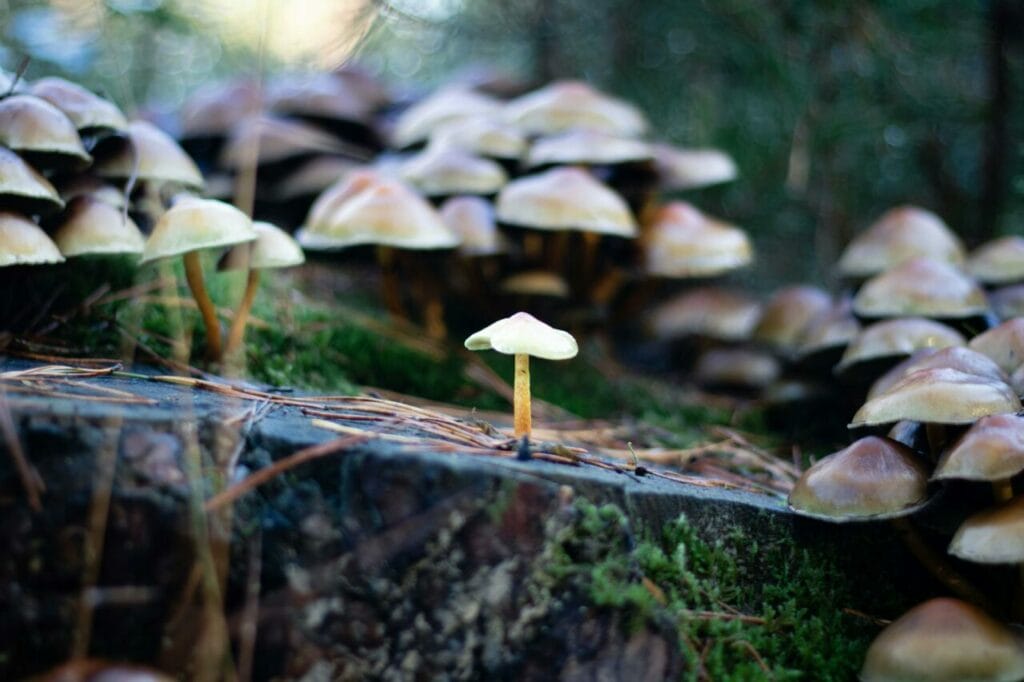Alzheimer’s Disease (AD) is a devastating neurodegenerative condition that currently has no known cure. With its increasing incidence, it presents a formidable challenge. Researchers are investigating better treatment methods, examining both naturally occurring and artificially produced substances.
Many clinical studies have highlighted the potential benefits of serotonergic psychedelics such as LSD, DMT, and psilocybin in the treatment of Alzheimer’s disease. To learn more, delve deeper into online resources or consider “purchasing psychedelics online in Canada.”
[toc]
The Therapeutic Potential of Psychedelics in Alzheimer’s Treatment
Conventional psychedelics demonstrate promise in treating initial stages of Alzheimer’s Disease (AD) or mild cognitive impairment (MCI) by stimulating the growth of brain cells.
Psychedelics may foster neural adaptability for learning and memory by targeting specific brain receptors. This could potentially halt or even reverse the neurodegenerative effects of AD. Additionally, psychedelics could reduce depression and anxiety, often seen in AD patients, by inducing positive psychological outcomes.
Questions remain about how psychedelic therapies work. Some suggest that intense effects from high-dose psychedelics, like mystical experiences or self-dissolution sensations, are necessary to achieve psychological benefits. Others argue that the biological changes prompted by these substances are the key factor. Both viewpoints may have merit.
It appears that conventional psychedelics can help the brain adjust and diminish inflammation, even at lower doses. Thus, low-dose therapies may be beneficial for conditions like brain deterioration or migraines without significant mind-altering effects. However, for depression, anxiety, or addiction, the mind-altering effects seem crucial, prompting introspection and behavioural modifications. As such, both low and high doses deserve investigation for personalized therapy.
The Impact of Serotonergic Psychedelics
Serotonergic psychedelics, including LSD (lysergic acid diethylamide), DMT (dimethyltryptamine), and psilocybin (found in magic mushrooms), are garnering attention.
There is growing interest in their possible therapeutic benefits for a range of mental health disorders.
Such conditions could potentially benefit from these therapies.
Experts point to serotonin receptors, recognized for their ability to boost cognition and regulate neuroplasticity, as a promising focal point in Alzheimer’s Disease (AD) research.
These substances mainly exert their pharmacological effects by modifying the serotonin system in the brain. This induces alterations in perception, mood, and consciousness. Here are some findings from various studies that back up this idea:
- In particular, the 5-HT2A subtype of the receptors influences the gene expression of neuroplasticity-enhancing neurotrophins in brain areas impacted by AD.
- These receptors control cortical signalling, which is vital for cognition, memory, and synaptic plasticity.
- Despite their unusual distribution within neurons, serotonin receptors play a significant role in neural development, regeneration, and plasticity.
Significant Research Findings
- Serotonergic psychedelics show potential in alleviating aspects of AD pathology by promoting neuroplasticity.
- Classic psychedelics influence neurotransmission, stimulate synaptic remodelling, and enhance factors that aid neuronal survival.
- Specific psychedelics, such as muscimol and Sig-1R agonists, could reduce the neurotoxicity associated with AD progression.
- Classic psychedelics stimulate pathways in brain regions affected by AD, indicating potential for slowing down or reversing brain degeneration.
- Psilocybin mushrooms activate neural plasticity to stimulate neurogenesis and cause lasting changes in brain circuits.
- Psychedelics improve brain connectivity by targeting receptor genes and triggering changes in neurons and networks.
Clinical research suggests that both classic and non-classic psychedelics derived from magic mushrooms affect various biological processes in the brain. These effects encompass quick shifts in gene expression and substantial changes in brain structure and functioning.
These psychedelics engage with receptors like serotonin, sigma, NMDA, and GABA, resulting in improved synaptic plasticity and brain rejuvenation. Thus, psychedelics could potentially produce positive impacts on behaviour, memory, and cognition, establishing them as promising options for treating AD and similar disorders.
Obtain Psychedelics Online in Canada
Welcome to our digital marketplace, where we offer a wide variety of psychedelic items within the region of British Columbia, Canada. If you’re thinking about trying microdosing with magic mushrooms, we suggest beginning your exploration with a reputable medicinal mushroom dispensary.
- LSD
LSD is a synthetic substance derived from a fungus called ergot, which colonizes rye grains. Even in minor doses, this psychoactive compound can modify perceptions, emotions, and cognitions.
Excessive consumption of LSD can lead to profound hallucinations, warping your sense of time and space. Be cautious, as products marketed as LSD may actually be other drugs such as NBOMe or members of the 2C drug family.
| Product | Kittease – Ketamine Microdose Troche (30x50mg) | Zenly – LSD Gel Tabs – 600ug (100ug Per Tab) | Zenly – LSD Gummies – Sour Zen Berry – 200ug (100ug Per Gummy) |
| Purpose | Stress, depression, pain management, PTSD, OCD, work-induced stress, performance anxiety, insomnia, and addiction. | Extraordinary experiences | Extraordinary experiences |
| Dosage | 50mg per troche / 30 per pack – 1.5 grams of ketamine/ per pack | 600ug total/6 Tabs (100ug/Tab) | 200ug total/2 Gummies (100ug/Gummy) |
| User Instructions | Consume one full troche | Ingest one full tab for the full effect. Do not take another for at least 2 hours. | Consume one full gummy for the full effect. Do not take another for at least 2 hours. |
| Advantages | Rapid onset with minimal risk, enhanced openness, ideal for introspection and cognitive improvement. | Precisely measured for the perfect trip, lab-verified | Precisely measured for the perfect trip, lab-verified |
- Magic Mushrooms
Over 180 varieties of mushrooms are known to contain psilocybin and psilocin, compounds renowned for their therapeutic properties and positive impact
on mental health.The effects may vary depending on the type of mushroom, the cultivation batch, the ingested quantity, and individual tolerance levels. Some people opt for microdosing to experience subtle effects, while others ingest larger amounts for a more intense experience. The quality can also differ based on the cultivation methods.
Blue Meanies, scientifically identified as Panaeolus cyanescens, are small dried fungi that flourish in warm tropical climates, typically on cow and water buffalo dung. As they grow, blue specks appear on their surface, from which their name derives.
- These fungi are rich in psilocybin and psilocin, which are highly concentrated.
- They have a history of recreational use, especially among the Balinese people, who consume them during celebrations and for artistic inspiration.
- They are popular among tourists and travelers in Bali and similar places due to their hallucinogenic properties. These effects can include feelings of euphoria, hallucinations, happiness, and intense laughter.
- DMT
DMT, a potent hallucinogenic substance, is found in certain plants such as Psychotria viridis and Chacruna. Often called the “spirit molecule,” these controlled substances can trigger deep psychedelic experiences. They offer a short but intensely immersive experience characterized by vibrant visual and auditory hallucinations.
| Product | Dream Machine – Vape Cartridge – DMT 1ml | Integral Alchemist – ACACIA Changa Pre-Roll | Integral Alchemist – Mimosa- 1ml DMT Vape Cart |
| Description | Explore hyperdimensional realms with DMT. | Experience effects akin to ayahuasca, combining a mix of herbs and DMT. | Embark on a journey of mystical visions and spiritual insights with DMT. |
| DMT Content | 1g | About 90mg | 1ml |
| Instructions | Preheat the cartridge and inhale gently. | Consume the pre-roll at a pace that suits you. | Inhale the vapor for instant effects. |
| Effects | Intense hallucinations, altered state of consciousness. | A visual psychedelic expedition, prolonged duration. | Spiritual awakening, euphoria, significant shifts in viewpoint. |
| Duration | Varies from person to person | Up to 1 hour | Up to 30 minutes |
Long-Term Impact of Psychedelic Use
Present studies aim to decipher the long-term consequences of consuming psychoactive substances. The term “long-term effects” represents any persistent changes to cognition, emotion, or memory following extensive use of psychedelics, even though our understanding in this field continues to evolve.
The examination of long-term effects of psychedelics is complex. Some studies propose potential mental health benefits, while others indicate potential risks, such as inciting psychosis.
Researchers continuously strive to understand the effects of prolonged psychedelic use on mental health, despite the complexity. They conduct comprehensive research, tracking individuals over substantial periods to collect more accurate information.
Purchase Cannabis from a Verified Vendor
Research suggests a significant evolution in Alzheimer’s disease treatment, indicating that psychedelics could dramatically change how we tackle brain disorders. Experts assert that the therapeutic use of these substances could completely reshape Alzheimer’s therapy, providing renewed optimism for numerous patients and their loved ones.
For premium products, opt for a verified vendor such as Magic Mushrooms Montreal Canada. Offering a wide range of cannabis products, including flowers, edibles, concentrates, and more, Magic Mushrooms Montreal Canada ensures genuine, lab-tested items that adhere to rigorous food and drug regulations.
Place your order for shrooms online now.
Frequently Asked Questions
What distinguishes psychedelics from other substances usually used in Alzheimer’s treatments?
Psychedelics are unique from traditional Alzheimer’s medicines in their therapeutic strategy and impacts. They promote new neural connections by focusing on the brain’s serotonin system, facilitating profound psychological experiences that foster emotional health.
Unlike typical drugs that primarily manage symptoms, psychedelics are being assessed by Health Canada for their lasting benefits and comprehensive treatment approach, which includes therapy.
Research into the use
The use of psilocybin for conditions like obsessive-compulsive disorder, along with its safety record in preventing multi-organ failure, distinguishes it from traditional controlled substances.
Can psychedelic-aided therapy be a viable treatment for Alzheimer’s patients facing end-of-life distress?
Psychedelic-aided therapy could potentially be beneficial for seriously ill Alzheimer’s patients who are coming to terms with their mortality.
- It offers emotional solace. This type of therapy has been shown to reduce feelings of anxiety and depression in some individuals, especially those who are gravely ill. This could also be advantageous for Alzheimer’s patients.
- Generally safe when monitored. When given in a secure setting under the supervision of a trained therapist, the use of psychedelics like this is generally harmless and is well-accepted by most people.
- May improve quality of life. For a person with Alzheimer’s, an emotional boost can make a substantial difference, even if there’s no improvement in memory issues.
- Further research is required. While this therapy seems promising, more research is needed to validate its safety and effectiveness for Alzheimer’s patients, especially those in the terminal stages of their lives.
How long does a psychedelic therapy session last for Alzheimer’s patients?
- Preparation Stage. This stage includes one or two sessions, each lasting from 1 to 2 hours. These sessions are aimed at preparing the patient for the forthcoming experience, establishing expectations, and building rapport with the therapist.
- Main Psychedelic Session. This key session, during which the patient consumes the psychedelic substance, typically lasts between 4 to 6 hours. The patient spends this time in a controlled setting, often lying down with eye shades on and listening to music, while therapists closely monitor them.
- Integration Stage. After the session, follow-up meetings are held to help the patient understand and integrate their experience. These sessions usually last 1 to 2 hours each, with the number of sessions varying.
You may also want to check out:





